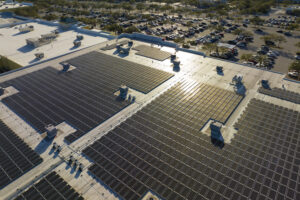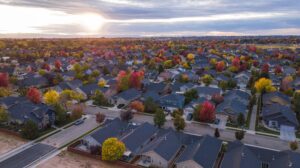NCCETC leads $2 million DOE funded project to improve siting and permitting for large-scale renewable energy facilities
On March 25, 2024, the U.S. Department of Energy (DOE) announced up to $22 million in funding for planning, siting, and permitting improvements for large-scale renewable energy facilities under President Biden’s Investing in America Agenda. The six state-based projects that will receive $10 million through the Renewable Energy Siting through Technical Engagement and Planning (R-STEP) program were announced as well. These projects are intended to support initiatives at the state level that provide training and technical resources as communities and governments plan for large-scale renewable energy and energy storage projects.
An additional $12 million in funding for a second round of the program was introduced by the DOE to continue efforts of decarbonization to meet President Biden’s goals of a clean electricity sector by 2035 and a net-zero emissions economy by 2050.
According to U.S. Secretary of Energy Jennifer Granholm, one of the largest roadblocks to deploying clean energy generation is siting and permitting. Making resources available and accessible to residents will simplify these processes and create opportunities for community engagement in implementing large-scale renewable energy projects. A large portion of the projects are anticipated to be built on private land where permitting decisions are made by local governments, which is where R-STEP comes in. The R-STEP collaboratives will work with stakeholders and local decision-makers to evaluate their needs and will then create state-specific resources for training and technical assistance.

R-STEP is housed under the U.S. DOE Office of Energy Efficiency & Renewable Energy (EERE). The program is aimed to emphasize community involvement and science-based siting processes for renewable energy developers and permitting authorities when looking to develop large-scale renewable energy and energy storage projects. The goal is to increase opportunities for workforce development, grid resilience, electricity bill savings, and community wealth-building, with a focus on rural and underserved communities. R-STEP is intended to be a “go-to” resource for information and engagement when it comes to state-based renewable energy planning, siting, and permitting.
Round one of the R-STEP application awardees were announced in the March 25 notice, the states selected are Indiana, Iowa, Michigan, Mississippi, North Carolina and South Carolina, and Wisconsin.

North Carolina and South Carolina will be led by the North Carolina Clean Energy Technology Center (NCCETC), and the project was awarded $2 million over three years. Associate Director of Policy & Markets at NCCETC, Autumn Proudlove, explained that there are important permitting decisions made at the local level, and misinformation or confusion about renewables often hinders development of these projects. Proudlove says they are “trying to address these challenges by creating resources and providing technical assistance”, focused on local level siting and permitting.
After the announcement in March, the contract was recently finalized. NCCETC is approaching the project in three phases, the first being to gather information about the questions and concerns local communities have about renewable energy, specifically solar and wind energy. A survey will be done throughout communities within North Carolina and South Carolina, followed by various community meetings. Proudlove says they will focus on disadvantaged communities to ensure their questions and concerns are heard. NCCETC will also meet with renewable energy developers, as they have valuable first-hand experience.
The second phase is to build an online technical assistance hub along with resources for communities across the two states. Forms to request assistance, white papers on identified issues, and model ordinances for each state are anticipated to be included in the online portal. The last phase of the project is more hands-on and will involve workshops and technical assistance with local governments.

NCCETC’s funded partners that were announced in March are NC State Cooperative Extension, the Center for Energy Education, South Carolina Energy Office, and Southeastern Wind Coalition. The North Carolina State University Center for Urban Affairs and Community Services will be conducting the survey in North Carolina and South Carolina communities. The North Carolina State Energy Office and the Carolinas Clean Energy Business Association will also work with NCCETC to meet the goals of the project.
Proudlove says they are working with the partners to begin creating an agenda for community meetings, developing the survey, and to form a program advisory committee. NCCETC aims to provide fact-based information, making the information available for decision makers to ensure they are well positioned to facilitate renewable energy development in a responsible way.
The U.S. DOE opened applications for round two of the R-STEP program from April 17, 2024, to June 13, 2024. Up to $2 million will be awarded to each of the six or seven state-based collaboratives selected to further deploy technical assistance and resources across the United States.